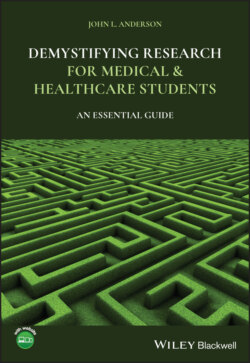Читать книгу Demystifying Research for Medical and Healthcare Students - John L. Anderson - Страница 20
Experimental Approaches
Оглавление1 Laboratory experiments: Most of us will remember our time in laboratories doing experiments. I remember tedious hours of work in the Chemistry labs doing titrations. You know, the sort of experiment where you have a measured amount of one chemical, A, in a beaker, and you painstakingly introduce into this – drip by boring drip – another chemical, B, from a burette … The rationale of these experimental studies is simple – you have almost complete control over the experimental environment, so that you can rule out extraneous (external) variables, such as spores that drift in the open window (as happened to Alexander Fleming – a sloppy researcher!) and you can reasonably confidently assume that any changes you record are due to the experimental variable that you have introduced. We can also use a control situation – for example, in culture studies, we would leave a petri dish with no culture for testing alongside the test dishes. Then we can identify the ‘Fleming effect’ if some external ‘contaminant’ gets in by chance and corrupts our findings.Laboratory experiments can also be conducted with animal and human ‘subjects’ or ‘participants’ and I shall go into depth on these in the Chapters 2 and 3.
2 Non‐randomised trials: These are experimental approaches (often used in drug development) in which an experiment is conducted – but there is no control situation or control group. These are covered in depth in Chapter 4.
3 Randomised control trials ( RCTs ): These are perhaps the most widely known and widely used experimental approach in medicine. Here we take the rationale of the laboratory experiment and take it beyond the laboratory. These are widely used to test the efficacy of new interventions or diagnostic tools. We recruit a group of participants and randomly allocate them to an experimental group or a control group. Those in the experimental group are given a new drug or treatment, whilst those in the control group get their standard treatment, usually with a placebo – an inert drug or treatment. If those in the experimental group do better than those in the control group, then we conclude that the new drug or treatment is better than the standard – or no treatment. There are many issues involved in RCTs and I shall discuss these in depth in Chapter 5.
